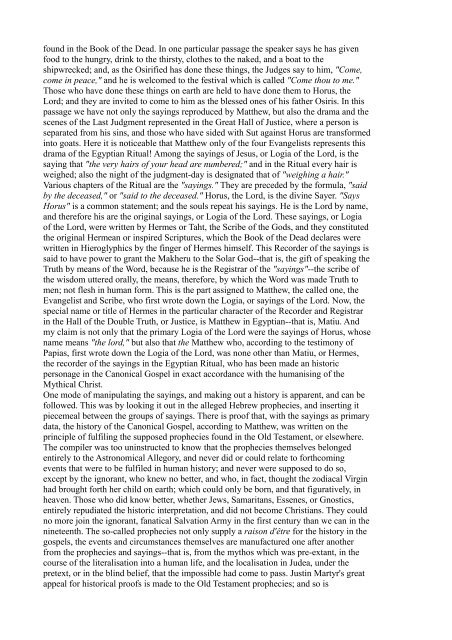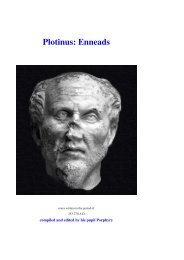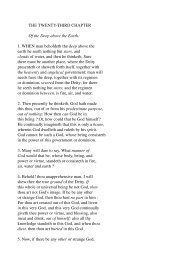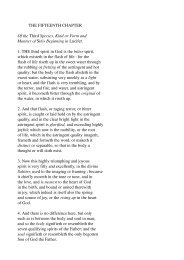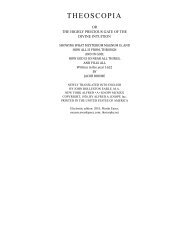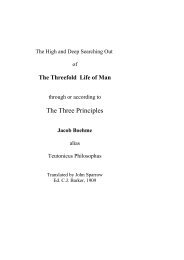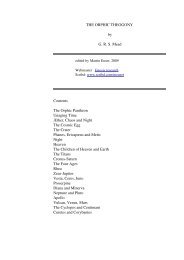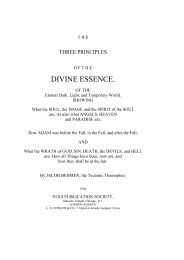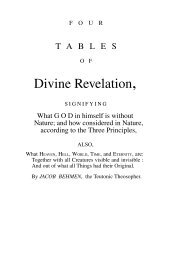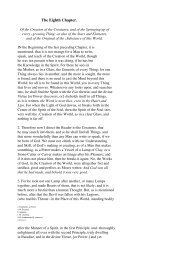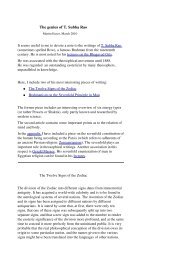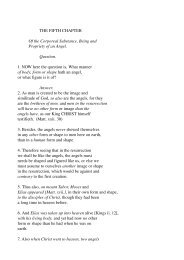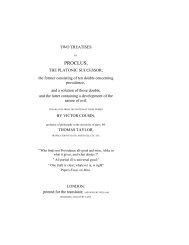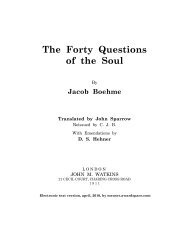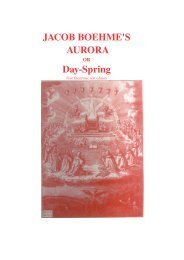Gerald Massey's Lectures - Society in evolution - Awardspace
Gerald Massey's Lectures - Society in evolution - Awardspace
Gerald Massey's Lectures - Society in evolution - Awardspace
You also want an ePaper? Increase the reach of your titles
YUMPU automatically turns print PDFs into web optimized ePapers that Google loves.
found <strong>in</strong> the Book of the Dead. In one particular passage the speaker says he has given<br />
food to the hungry, dr<strong>in</strong>k to the thirsty, clothes to the naked, and a boat to the<br />
shipwrecked; and, as the Osirified has done these th<strong>in</strong>gs, the Judges say to him, "Come,<br />
come <strong>in</strong> peace," and he is welcomed to the festival which is called "Come thou to me."<br />
Those who have done these th<strong>in</strong>gs on earth are held to have done them to Horus, the<br />
Lord; and they are <strong>in</strong>vited to come to him as the blessed ones of his father Osiris. In this<br />
passage we have not only the say<strong>in</strong>gs reproduced by Matthew, but also the drama and the<br />
scenes of the Last Judgment represented <strong>in</strong> the Great Hall of Justice, where a person is<br />
separated from his s<strong>in</strong>s, and those who have sided with Sut aga<strong>in</strong>st Horus are transformed<br />
<strong>in</strong>to goats. Here it is noticeable that Matthew only of the four Evangelists represents this<br />
drama of the Egyptian Ritual! Among the say<strong>in</strong>gs of Jesus, or Logia of the Lord, is the<br />
say<strong>in</strong>g that "the very hairs of your head are numbered;" and <strong>in</strong> the Ritual every hair is<br />
weighed; also the night of the judgment-day is designated that of "weigh<strong>in</strong>g a hair."<br />
Various chapters of the Ritual are the "say<strong>in</strong>gs." They are preceded by the formula, "said<br />
by the deceased," or "said to the deceased." Horus, the Lord, is the div<strong>in</strong>e Sayer. "Says<br />
Horus" is a common statement; and the souls repeat his say<strong>in</strong>gs. He is the Lord by name,<br />
and therefore his are the orig<strong>in</strong>al say<strong>in</strong>gs, or Logia of the Lord. These say<strong>in</strong>gs, or Logia<br />
of the Lord, were written by Hermes or Taht, the Scribe of the Gods, and they constituted<br />
the orig<strong>in</strong>al Hermean or <strong>in</strong>spired Scriptures, which the Book of the Dead declares were<br />
written <strong>in</strong> Hieroglyphics by the f<strong>in</strong>ger of Hermes himself. This Recorder of the say<strong>in</strong>gs is<br />
said to have power to grant the Makheru to the Solar God--that is, the gift of speak<strong>in</strong>g the<br />
Truth by means of the Word, because he is the Registrar of the "say<strong>in</strong>gs"--the scribe of<br />
the wisdom uttered orally, the means, therefore, by which the Word was made Truth to<br />
men; not flesh <strong>in</strong> human form. This is the part assigned to Matthew, the called one, the<br />
Evangelist and Scribe, who first wrote down the Logia, or say<strong>in</strong>gs of the Lord. Now, the<br />
special name or title of Hermes <strong>in</strong> the particular character of the Recorder and Registrar<br />
<strong>in</strong> the Hall of the Double Truth, or Justice, is Matthew <strong>in</strong> Egyptian--that is, Matiu. And<br />
my claim is not only that the primary Logia of the Lord were the say<strong>in</strong>gs of Horus, whose<br />
name means "the lord," but also that the Matthew who, accord<strong>in</strong>g to the testimony of<br />
Papias, first wrote down the Logia of the Lord, was none other than Matiu, or Hermes,<br />
the recorder of the say<strong>in</strong>gs <strong>in</strong> the Egyptian Ritual, who has been made an historic<br />
personage <strong>in</strong> the Canonical Gospel <strong>in</strong> exact accordance with the humanis<strong>in</strong>g of the<br />
Mythical Christ.<br />
One mode of manipulat<strong>in</strong>g the say<strong>in</strong>gs, and mak<strong>in</strong>g out a history is apparent, and can be<br />
followed. This was by look<strong>in</strong>g it out <strong>in</strong> the alleged Hebrew prophecies, and <strong>in</strong>sert<strong>in</strong>g it<br />
piecemeal between the groups of say<strong>in</strong>gs. There is proof that, with the say<strong>in</strong>gs as primary<br />
data, the history of the Canonical Gospel, accord<strong>in</strong>g to Matthew, was written on the<br />
pr<strong>in</strong>ciple of fulfil<strong>in</strong>g the supposed prophecies found <strong>in</strong> the Old Testament, or elsewhere.<br />
The compiler was too un<strong>in</strong>structed to know that the prophecies themselves belonged<br />
entirely to the Astronomical Allegory, and never did or could relate to forthcom<strong>in</strong>g<br />
events that were to be fulfiled <strong>in</strong> human history; and never were supposed to do so,<br />
except by the ignorant, who knew no better, and who, <strong>in</strong> fact, thought the zodiacal Virg<strong>in</strong><br />
had brought forth her child on earth; which could only be born, and that figuratively, <strong>in</strong><br />
heaven. Those who did know better, whether Jews, Samaritans, Essenes, or Gnostics,<br />
entirely repudiated the historic <strong>in</strong>terpretation, and did not become Christians. They could<br />
no more jo<strong>in</strong> the ignorant, fanatical Salvation Army <strong>in</strong> the first century than we can <strong>in</strong> the<br />
n<strong>in</strong>eteenth. The so-called prophecies not only supply a raison d'être for the history <strong>in</strong> the<br />
gospels, the events and circumstances themselves are manufactured one after another<br />
from the prophecies and say<strong>in</strong>gs--that is, from the mythos which was pre-extant, <strong>in</strong> the<br />
course of the literalisation <strong>in</strong>to a human life, and the localisation <strong>in</strong> Judea, under the<br />
pretext, or <strong>in</strong> the bl<strong>in</strong>d belief, that the impossible had come to pass. Just<strong>in</strong> Martyr's great<br />
appeal for historical proofs is made to the Old Testament prophecies; and so is


